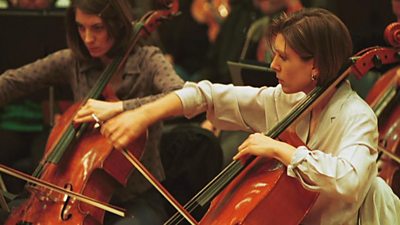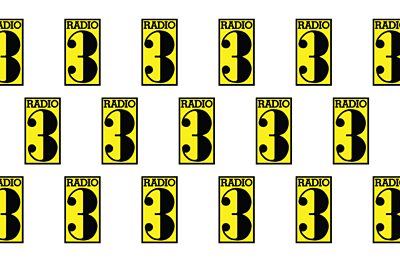From Weber, Bartok and Bach, to jazz, the avant-garde and world music - this is Radio 3. But there’s more. Drama, philosophy, progressive rock, even sport - the network has always been full of surprises. But getting there hasn’t always been easy.
1971: Pied Piper
The next generation of serious music listeners – where were they?
The switch from the Third Programme to Radio 3 posed many questions. Would there still be serious music, could younger people be persuaded to listen?
By 1971 these questions had largely been answered and much to older listeners delight, live serious music and speech were retained. But one question was left unanswered. Where was the next generation of serious music listeners? In the 70s would any self-respecting teenager admit to liking classical music?
Musician David Munro thought young people could be persuaded into classical, world, baroque, ancient, and electronic music. Many were and Pied Piper was broadcast for a staggering 655 editions.
-
-
-
-
The tragic story of the man who inspired millions to love music Phil Hebblethwaite looks at the life of David Munrow
1973: The Positive World
The Positive World: if there’s room for gloom is there room for ‘positive’ news?
1973 and UK news is dominated by industrial unrest, but the Vietnam war is ending, some rare positive news. Is it time to broadcast ‘good news’?
News had not been a regular fixture on Radio 3. Music had to take priority, but maybe the network could approach it differently? Perhaps the settled truths of journalism could be tested? What about ‘positive’ news? Where was that in the sickening daily diet of death and destruction?
For two years Peter Watson tied to turn ‘news values’ on their head, not in a misleading propaganda of optimism, but simply giving the ’other’ side of a story. ���˿��� management applauded, the audience was unsure.
-
Philip Dodd hosts a debate about drama on the page, stage, screen and in the way news stories are presented at the Radio 3 Free Thinking Festival
1975: Sounds Interesting
Sounds Interesting – to some!
Progressive rock had more in common with classical music than it did with the pop, or so the thinking at Radio 3 went in the 1970s.
This was an attitude held firmly by producer George MacBeth who was convinced it was the key to getting an ‘intelligent hard core of new young listeners’ to tune in to Radio 3. Not everyone was convinced including Radio 3 Controller Roger Ponsonby. He felt ‘prog rock’ on Radio 3 pushed the station to its limits - many agreed.
The programme developed a loyal following however, so maybe MacBeth’s persistence paid off and was responsible at least in part, for Radio 3’s success into the future.
1987: World Music
Going global for 30 years
From the Queen Elizabeth Hall in London, the music of Tibet was the first major celebration of World Music on Radio 3 – it was time to go global.
This was summer 1987 and it was a sequence of Gar (or 'Court') pieces, Nangma and Toshe songs that were to herald this first serious foray for Radio 3 into non-western music. Throughout that July evening music from the Andalusian courts could be also be heard, and the following evening the ancient epic of Central Asia, Ge-sar, was performed by Tu Den, again from Tibet.
Today Radio 3 regularly presents new world talent on World on 3 through ���˿��� Music’s ���˿��� Introducing scheme.
1987: Jazz at the Proms
Jazz makes it to the Proms
By the 1960s jazz was the acceptable face of Radio 3’s venture into the non-classical. By 1987 it was heading for the Proms!
In 1964 jazz made it onto the Third Programme. Jazz Record Requests, still on air in 2017, found a home on the network because the genre was considered complex enough to study and discuss, and wasn’t ‘popular’ like pop! By the 1980s it was about to take a new leap forward. To much acclaim the Proms hosted its first jazz line-up at Proms ‘87.
‘Loose Tubes’ became the first jazz orchestra to have a Prom to itself, and the music, all composed by members of the ensemble, included several premieres.
1989: Mainly for Pleasure
Radio 3 - with pleasure
Whilst other ���˿��� stations concerned themselves with news in the traditional ‘drivetime’ slot, Radio 3 took it easy, with an hour of lighter classics.
Without competition Radio 3 stood out in the early evening. Mainly for Pleasure, known so well for the measured tones of its host Richard Baker, began life in the hands of a performer. Clarinettist Jack Brymer was first at the helm. As co-principle clarinet for the ���˿��� Symphony Orchestra, and principal in the London Symphony Orchestra, he came with a good pedigree.
In Tune is now the Radio 3 afternoon programme, with Sean Rafferty presenting for 20 years.
-
-
Omnibus - Richard Long In this extract from the long-running arts programme, Richard Baker introduces a short film celebrating the elusive English sculptor and land artist Sir Richard Long, showing him at work on Dartmoor.
1992: Test Match Special
Cricket on Radio 3?
Classical music and ball-by-ball cricket commentary seem odd bedfellows, but it was a fact that the two were broadcast together between 1956 and 1994.
The curious situation came about because music used only to be broadcast in the evenings on the old Third Programme, and there was space in the daytime schedule for Test Cricket. With the advent of Radio 3, and the expansion of music programmes, the ���˿��� faced a dilemma. Now cricket really was up against classical music, there still being no dedicated sports station.
Coverage was switched awkwardly between Radio 3 and 4, FM and AM, and a solution was only found with the opening of Radio 5 Live.
-
Desert Island Discs: John Drummond Sue Lawley's castaway is director of the Promenade Concerts John Drummond.
1995: The Sorrow of Sarajevo
The Radio 3 treasure trove - drama, documentary, the arts
With so much music to choose from, was there space for anything else? Radio 3 always made serious arts and drama a priority.
Taking the best talk from the Third Programme, and items from the experimental speech-only Network Three, Radio 3 began to build a reputation for engaging speech programmes. Amongst the landmarks was a poignant and unique take on the Yugoslav war, expressed through poetry.
Poets Amala and Goren Semic with readers Julia Watson and Alan Rickman explored The Sorrow of Sarajevo, taking the audience on a moving and surprising audio journey through the war torn city in the winter of 1995.
-
Between the Ears Celebrating 20 years of innovative and thought-provoking features that make adventurous use of sound and explore a wide variety of subjects.
1999: Late Junction
Stay up for Late Junction
Billed as ‘an eclectic mix of world music, ranging from the ancient to the contemporary’, the thrice weekly programme certainly lives up to its remit.
Starting in 1999, Late Junction has seen a raft of hosts bring with them their own specialist enthusiasms. You might hear something meditative to begin the 90 minute programme, followed by a track from 21st century Scandinavia. It never ceases to surprise yet doesn’t have listeners jumping from their beds, a trick not easy to pull off given it begins at 2300.
Fiona Talkington, Shaheera Asante and Verity Sharp are some of the best known presenters, but the team is always kept fresh and changing.
2014: Christmas Carol Competition
-
Radio 3 Carol Competition 2019 Radio 3 Breakfast
Getting competitive for Christmas
Coinciding with the 90th anniversary of the ���˿��� Singers in 2014, Radio 3 Breakfast’s Christmas Carol Competition has become a much loved institution.
This challenge is this. Listeners are asked to compose a brand new Christmas Carol to be performed by the ���˿��� Singers live on ���˿��� Radio 3. Entries can be written in any style, so there’s lots of freedom, but it must be either a cappella or with piano. Six carols are shortlisted and performed on air.
Then the audience at home votes for their favourite work, and the carol receiving the largest number of votes is performed live again on Radio 3 Breakfast. A choral feast for Christmas every year.
2016: The Cello and the Nightingale
The Cello and the Nightingale remembered
Every Spring the woods of Sussex resound with the song of the nightingale. In 2016 singer Alice Zawadzki made music with them for Radio 3.
This delightful idea was in fact a recreation from the ���˿���’s earliest days. In 1924 cellist Beatrice Harrison played in her garden, a nightingale sung, and the sonorous combination broadcast live. It was a transmission that spoke to the public, and was the first time people had been able to hear wildlife broadcast live on radio.
The annual event was broadcast every Spring, up until World War Two. For Late Junction the recreation proved to be just as moving as the original.
-
Alice Zawadzki & Sam Lee collaborate with nightingale Late Junction
-
19 May 1924
2017: The home of classical music

The home of classical music
Radio 3 has classical music at its core and broadcasts more live music than any other radio network.
A new Afternoon Concert extending afternoon listening by 30 minutes, a long sequence of words and music devoted to Johann Sebastian Bach’s famous journey from Arnstadt to Lübeck in Slow Radio, and Radio 3 In Concert broadcasting live concerts to mark the return of Sir Simon Rattle to the UK, are amongst recent offerings. And as part of the wider ���˿��� Opera Season, ���˿��� Radio 3 will broadcast all seven operas featured in the V&A’s opera exhibition in collaboration with the Royal Opera House.
-
���˿��� Radio 3 Visit the ���˿��� Radio 3 website
Radio timelines
-

Radio 1 timeline
Love-ins at Woburn and San Francisco, the devaluation of Sterling, the Monkees and the Maharishi, and the beginning of the 'exciting new sound of wonderful Radio 1’. Our timeline explores the highs and lows of the station that rocked the nation. -

Radio 2 timeline
How Radio 2 became the station we hear today via soothing instrumental light music, middle of the road classics, and a weekly soap opera. -

Radio 3 timeline
From Weber, Bartok and Bach, to jazz, the avant-garde and world music, drama, prog rock and sport - Radio 3 has always been full of surprises. -

Radio 4 timeline
To see the world differently, listen - how Radio 4 reinvented itself from the ���˿��� Service.
